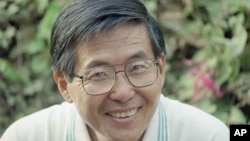Authorities and supporters on Saturday said goodbye to former Peruvian President Alberto Fujimori, who ruled the Andean country with a strong hand for a decade. The government of Dina Boluarte paid him state honors while his detractors criticized the measure, citing his record on human rights.
The former president, who He died at the age of 86 of cancer, was a divisive figure in recent decades among Peruvians, with many venerating his figure and others flatly rejecting it.
Following his death, the government declared three days of national mourning, less than a year after he was released from prison after a pardon that cut short a 25-year sentence for two massacres during his regime.
President Dina Boluarte, accompanied by her ministers, led the funeral service for Fujimori at the Government Palace, “in accordance with the posthumous honors given to a former president.” She greeted and hugged the children and grandchildren present at the ceremony.
Hundreds of supporters gathered outside the presidential palace in central Lima, carrying wreaths and photographs of the late leader, as well as at the private cemetery where he was finally buried on Saturday afternoon.
The official ceremony began at 10:30 a.m. Lima time with a funeral mass at the National Theater, part of the Ministry of Culture.
“You are finally free from hatred and revenge. You are free from those people who did not forgive you, who rescued us from hunger and pain, from those 16 years of unjust imprisonment,” said his eldest daughter and former presidential candidate, Keiko Fujimori, with a trembling voice, after thanking the thousands of people who marched to touch the former president’s coffin.
His achievements, such as stabilising the country’s economy and stamping out the Shining Path in the 1990s, were hailed by loyalists, but detractors pointed to failures under an autocratic government.
“Thanks to him, terrorism is over,” said Felicita Ruiz, who traveled from the Andean region of Ayacucho, birthplace of the Maoist Shining Path, to pay tribute to the former president in Lima.
“It’s a shame because they are recognizing someone who was convicted and sentenced by the state itself for serious crimes,” Gisela Ortiz, sister of a student killed during the Fujimori era, told a local radio station. Successful.
The conflict with the rebel group left 69,000 civilians and military personnel dead or missing, according to a Truth Commission. The shadow of that conflict overshadows Peru to this day.
But while thousands of people like Ruiz stood in long lines to bid farewell to the son of Japanese immigrants in Peru as a hero, carrying photos and statuettes of the former leader who earned the nickname “Chino,” others protested against him.
“This tribute is an insult,” said Maria Carbajal, adding that she was one of thousands of women sterilized as part of a Fujimori government program to reduce poverty in Peru’s poor rural regions.
Some 300,000 women were sterilized in the nationwide campaign. Human rights groups and thousands of women say they were coerced. Fujimori has always maintained that the operations were consensual.
Longings and rejections
Assassinations by secret military groups during his rule in the 1990s and allegations of corruption severely damaged Fujimori’s image. He fled to Japan in 2000 after videos emerged showing his aides handing out wads of cash to lawmakers, businessmen and judges to support his government.
Fujimori is credited – much like former military dictator Augusto Pinochet in Chile – with putting Peru on a free-market economic course, helping turn the copper-rich country into one of Latin America’s most stable economies.
But Peru’s reputation has come under pressure recently, with six presidents in seven years and political instability weighing on investment in copper mining, the country’s main economic engine. That has in some ways further burnished the memory of Fujimori.
“I was hoping he would be president again,” said a sobbing Yusi Canchari, after travelling for hours from the interior of Peru to view his body. Fujimori’s daughter-in-law, Keiko, had said in July that he might run again.
“I just want to thank President Fujimori for everything he did for our country,” Canchari added. “He achieved peace. I remember that he built my little school, he built roads, he gave us uniforms, shoes and food.”
Fujimori’s death, in a strange coincidence, occurred exactly three years after the day his fierce enemy, the Shining Path leader Abimael Guzmanwho died in prison also at the age of 86.
[Parte de este informe proviene de Reuters]
Connect with the Voice of America! Subscribe to our channels YouTube, WhatsApp and to newsletter. Turn on notifications and follow us on Facebook, X and Instagram.







![[Img #74683]](https://thelatestnews.world/wp-content/uploads/2024/12/The-main-mistakes-to-avoid-when-betting-on-electronic-sports-150x150.jpg)




![The President of the Republic, Dina Ercilia Boluarte Zegarra, received the funeral procession of former Head of State, Alberto Fujimori. [Cortesía Presidencia del Perú]](https://thelatestnews.world/wp-content/uploads/2024/09/Funeral-of-former-Peruvian-President-Alberto-Fujimori-between-mourning-and.jpg)




Add Comment